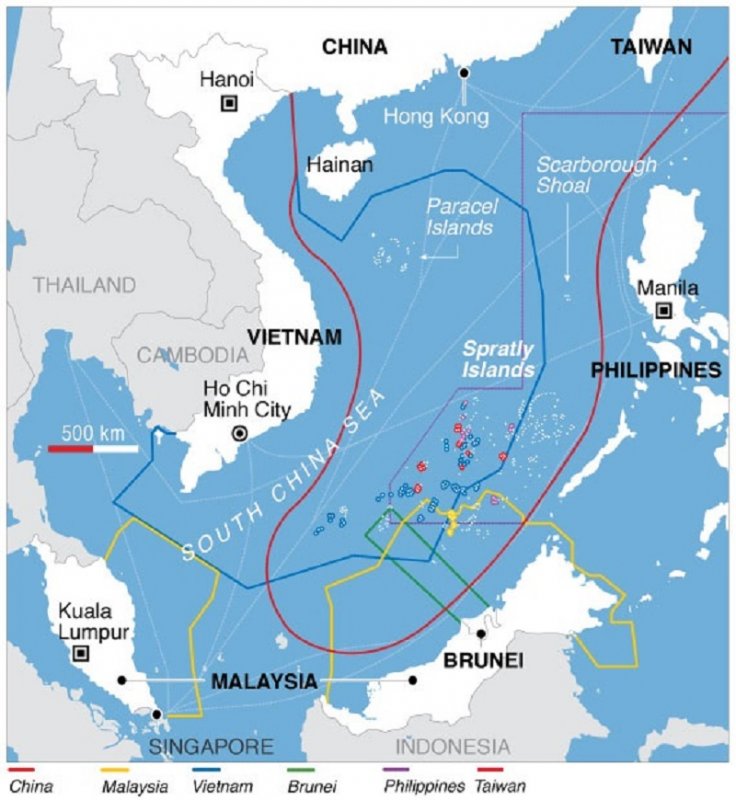Indonesia on Monday protested to Beijing over the intrusion of a Chinese coastguard ship that spent two days in its exclusive economic zone (EEZ) in the South China Sea. The incident occurred off Indonesia's Natuna Islands and is the latest in the string of intrusions by Chinese coastguard ships and fishing vessels in Indonesia's EEZ.
Indonesia has time and again complained about Chinese vessels entering the waters off the Natuna Islands, which are within Jakarta's exclusive economic zone but are also claimed by China. By reigniting a dispute with Indonesia over control of the Natuna Islands, China seems to be asserting its expansive territorial claims and challenging Indonesia, which has always maintained that it is a "nonclaimant" in the South China Sea.
China Does it Again

Indonesia's maritime security agency Bakamla said that the Chinese vessel left the EEZ after being shadowed by an Indonesian patrol boat at around noon on Monday "after arguing via radio".
"The Chinese coastguard said they were patrolling in Chinese jurisdiction. We firmly rejected this and said this is our economic exclusive zone," said Bakamla spokesman Wisnu Pramandita adding that the ship had been in Indonesia's EEZ "from Saturday until 11.30 am Monday".
The Indonesian Foreign Ministry has already asked for an explanation from the Chinese Embassy but is yet to get a reply. This is the latest in a string of similar intrusions by Chinese vessels in the disputed South China Sea off the Natuna Islands, which Indonesia has failed to stop despite lodging repeated protests with Beijing.
In late December, dozens of Chinese boats were fishing across at least 30 different locations within Indonesia's EEZ accompanied by several coast guard vessels. Indonesia summoned the Chinese ambassador to Jakarta and issued a strong diplomatic protest. But that doesn't seem to have helped much.
What Are China's Intentions?

Indonesia has always maintained that it is a "nonclaimant" in the South China Sea as it does not stake a legal claim in any of the disputed parts of the area. At the same time, it also does not recognize China's illegal claim over parts of the Natuna EEZ.
Beijing claims historic rights to parts of that sea overlapping Indonesia's exclusive economic zone. Brunei, Malaysia, the Philippines, Taiwan and Vietnam also have territorial claims that overlap with the sweeping claims of China in the South China Sea. But China has never fully defined the southern reaches of its expansive sovereignty claims in the South China Sea, which is demarcated on maps by its so-called nine-dash line that covers most of the area.
The recent intrusion as well as past skirmishes with Indonesia in 2016 that also occurred near the Natuna Islands are an attempt by China to prove that the area is part of its territorial waters and it is simply attempting to gradually make territorial gains.
China Attempting Territorial Gains

No doubt, China and Indonesia have a dispute around the Natuna EEZ. But a dispute implies that both sides equally have some rights under the law. The problem is that Indonesia's rights are recognized by international law, particularly the 1982 United Nations Convention on the Law of the Sea (UNCLOS), while China's are not.
According to UNCLOS, Indonesia only has overlapping claims with Malaysia and Vietnam in the area, while China's claims over the fishery resources aren't backed by the law. Moreover, following the 2016 faceoff between the two countries at the South China Sea, the International Tribunal on the Law of the Sea declared China's nine-dash line claim over the whole of the South China Sea to be illegal.
So, if there is a dispute at all, then what exactly is the basis of China's claims? Clearly, it is nothing but Beijing's age-old habit of making territorial gains, much like India's accusations of repeated intrusions by China in its territory.
Natuna is by far an easy target for China. Unlike in 2016, Beijing is now able to make better use of military outposts across the South China Sea for more routine patrols of its sovereignty claims. It now sees fresh opportunity in the Natuna Islands to exploit these new advantages. Indonesia's Natuna Islands lie approximately 700 miles to the southwest of China's Spratly outposts, placing them well within range of not only Chinese naval and coast guard ships, but also air force patrols originating from China's artificial islands.








